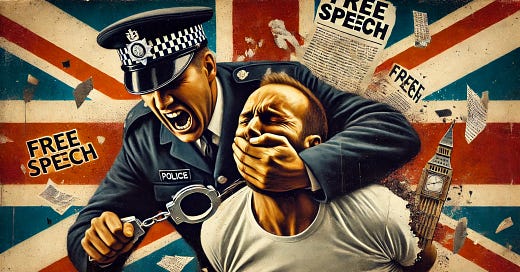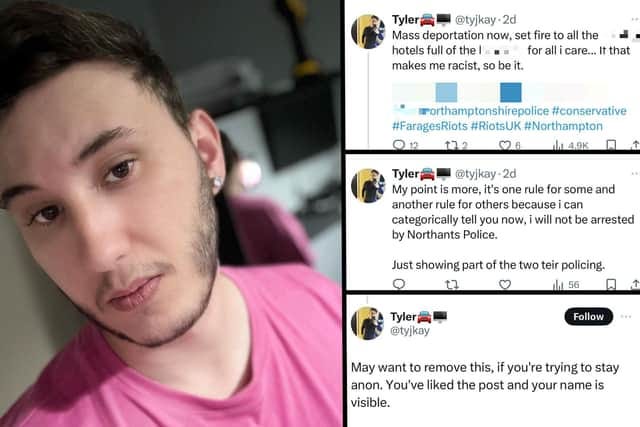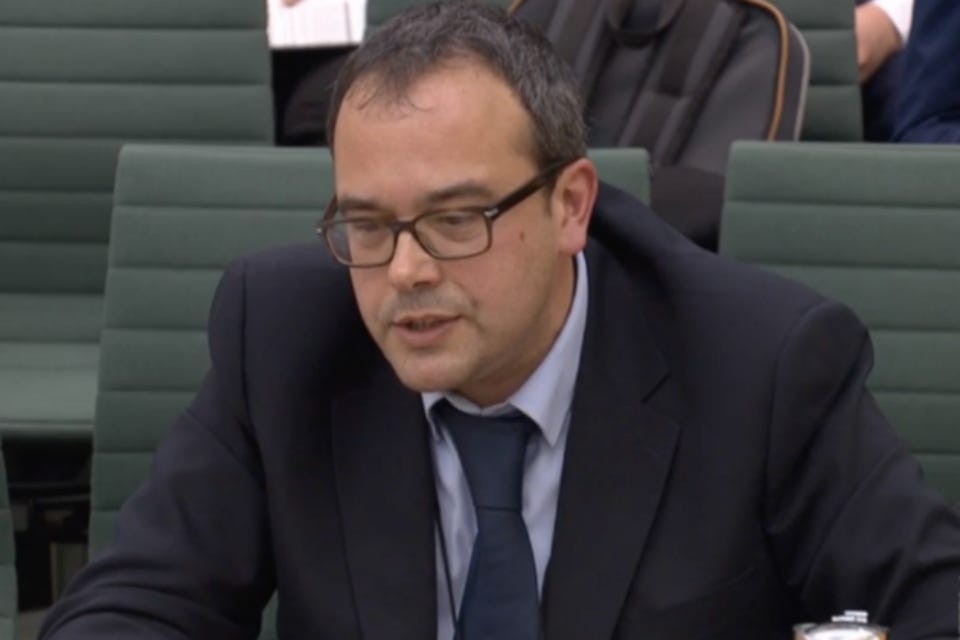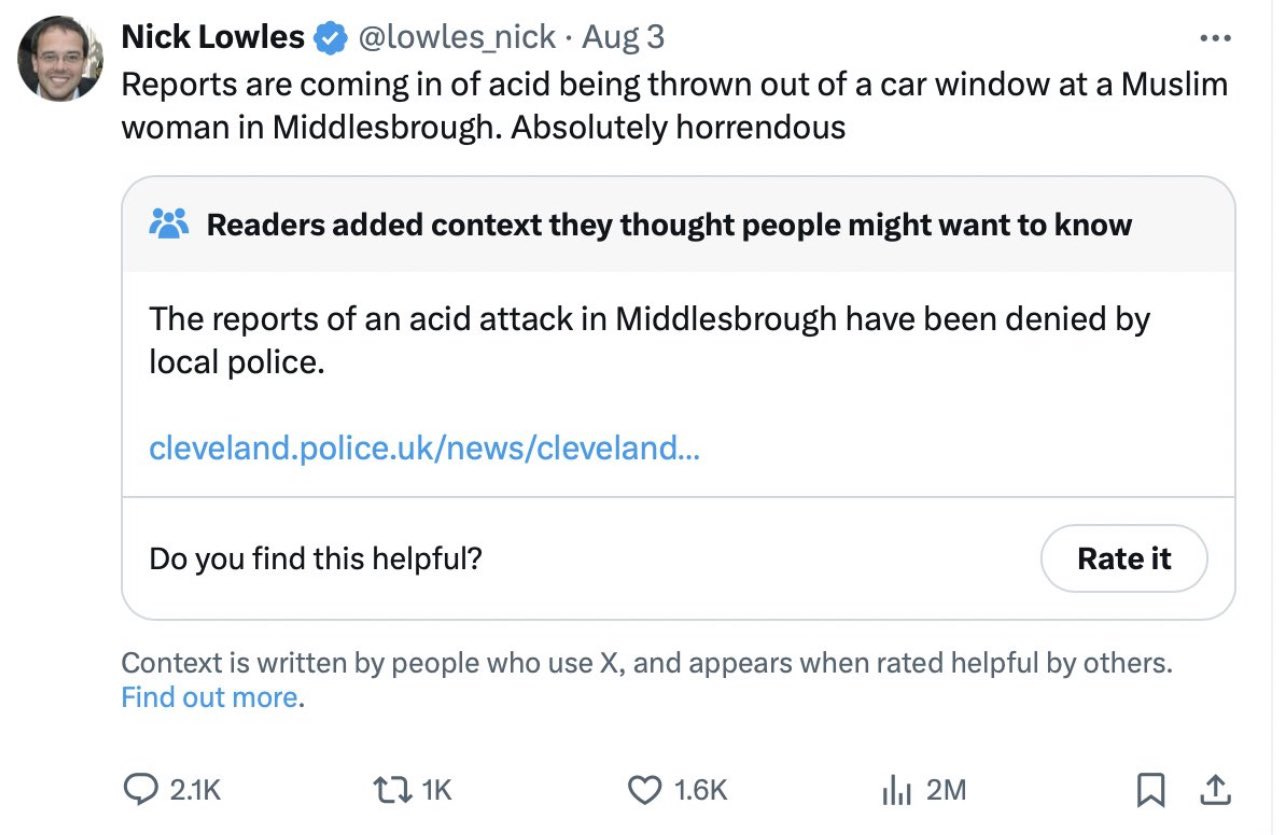Yes. There is Two-Tier Prosecuting and Here's Proof...
A look at some case studies to provide clarity.
The recent public outcry about authoritarianism in Britain, ignited by the authorities’ response to the Southport and mass immigration protests and riots, has raised significant questions about two-tier policing and sentencing.
These concerns strike at the heart of the justice system, where police enforcement and the judiciary are supposed to defend the citizenry by dispensing justice fairly and without prejudice. Yet, the public’s apparent increasing loss of faith in these institutions suggests that this is dissipating, and quickly.
Here’s a look at some specific examples to help shed light on whether these claims of two-tier justice hold any merit.
Tyler Kay
On August 9th, Northants Police announced that Tyler James Kay, a 26-year-old father of three, had been sentenced to 38 months for "stirring up racial hatred" online.
Several free speech advocates promptly jumped on the news - seemingly without investigating his posts on X - and claimed it constituted an obvious violation of free speech.
However, local paper Northampton Chronicle & Echo revealed Kay had clearly and directly incited violence in one of his X (formerly Twitter) posts:
"Mass deportation now, set fire to all the f****** hotels full of the b****** for all i care… if that makes me racist, so be it".
Despite this, Judge Adrienne Lucking sentenced Kay for "stirring up racial hatred"—an offence that hinges on a subjective interpretation of his intentions when he already broke clear laws specified in the Serious Crime Act of 2007, which prohibits encouraging unlawful action.
Kay did not mention any specific race in his original X post. Nor was there any evidence that his comments directly caused others to commit material violence.
Facing Judge Lucking at Northampton Crown Court last week, Kay denied intending to stir up racial hatred, but admitted “in hindsight” some of his posts “made [him] look like an idiot”.
Yesterday, that same judge sentenced 19-year-old convicted heroin dealer, Amjad Ali, to 14 months (24 months fewer than Kay) in prison for punching an unknown male in the face and aiming a “ferocious” kick to another’s head. Ali was in attendance of an “anti-racist” protest outside the office of an immigration law firm.
In a press release announcing Kay’s sentence, Detective Chief Superintendent Rich Tompkins said:
“I hope this case sends a very clear message to people who think they can hide behind a screen and publish hateful, racially prejudiced posts without consequence.
This case is not an example of preventing ‘freedom of speech’ as a small minority of people will claim.
It is about standing up for what is right and protecting our communities from fear of violence. After all, freedom of speech is not freedom to spread racial hatred.”
Ricky Jones
On August 8th, Labour councillor Ricky Jones was recorded at an “anti-racist” protest in London saying: "we need to cut... (disgusting Nazi fascists) throats and get rid of them."
Despite claims that Jones’s comments went unpunished, the Labour Party suspended him and police remanded him into custody within 24 hours.
Jaswant Narwal, chief crown prosecutor for CPS London North, confirmed that they charged Jones with “encouraging violent disorder.”
Like Kay, Jones did not mention any specific race—although it is unlikely he had ethnic minority “Nazi fascists” in mind—so it seems fair and logical that the Metropolitan Police would charge him with encouraging violent disorder.
Notably, however, they did not charge Jones with "stirring up racial hatred" like Northants Police did with Kay.
Bernadette Spofforth
On July 29th, Bernadette Spofforth posted on X, misidentifying the Southport child murderer as "Ali Al-Shakati." A week later, Cheshire Police arrested her for "stirring up racial hatred" and sending "false communications."
She maintains she did not do so intentionally and deleted her post as soon as she learnt the identity was incorrect.
Despite prefacing her post with "if this is true," Spofforth’s caveat did not prevent her arrest. Chief Superintendent Alison Ross linked Spofforth's "malicious and inaccurate communications" to “violent disorder”.
Now, violence did indeed break out at a mosque in Southport hours after her post but Spofforth was one of many to initially misname the suspect.
She never encouraged violence. Nor did she mention race or religion. Cheshire Police based their arrest on a subjective interpretation of her intentions, as well as a subjective interpretation of their effects, with no objective measure of proof.
The way they enforced the law effectively means that it doesn't matter if Spofforth unknowingly misidentified the suspect - the mistake justifies arrest if they so choose.
Cheshire Police’s use of a "false communications" arrest, made possible by the relatively new and highly controversial Online Safety Act 2023, adds another layer of concern.
This appears to be one of the first instances in which the act has been used. UK police can now arrest any individual they suspect of sending communications that are “false” or cause "non-trivial psychological harm".
It remains unclear whether this law can apply to objectively verifiable or debated information.
Nick Lowles
On August 3rd, following riots and protests, Nick Lowles, head of the "anti-racist" charity Hope Not Hate — which routinely tries to deplatform their political opponents for “misinformation” — posted on X, "reports are coming in of acid being thrown at a Muslim woman in Middlesbrough”.
Cleveland Police quickly denied any such reports, and Lowles corrected his statement afterward.
Days later, footage surfaced of what appeared to be men of Middle Eastern descent attacking others of Anglo-Saxon descent in Middlesbrough (obviously the footage is not enough to confirm a racial motive):
Spofforth's and Lowles' cases are very similar. Both seemingly unknowingly shared false information that was followed by violence. Yet, Cheshire Police arrested Spofforth while Cleveland Police (or the Metropolitan Police) did not arrest Lowles.
Other Cases of Note
Elsewhere in the UK, a judge denied bail to an 18-year-old who was reportedly observing a riot in Belfast, equating mere observance with active participation.
After he refused bail, District Judge Rafferty said anybody involving themselves as a participant or curious observer, except for exceptional circumstances, would be remanded into custody.
Meanwhile, the authorities in Newcastle granted early release for a convicted murderer after just six months, while another man in Hartlepool received a two-year sentence for swearing and gesticulating at police officers.
Thoughts
What seems clear is that some police departments have enforced the law equally while others have not.
The ones that have not have done so by two means. First, they’ve used different laws to arrest or charge different people for similar alleged crimes. Second, they’ve relied on heavily subjective laws that rest almost entirely on interpretation. So where they is a biased hierarchy, there follows biased two-tier policing and charging.
When you construct laws in the subjective, this is bound to happen.
The Public Order Act 1986 allowed police to arrest and the Crown Prosecution Service to prosecute anyone who “uses threatening, abusive or insulting words or behaviour, or displays any written material which is threatening, abusive or insulting, is guilty of an offence if he/she intends thereby to stir up racial hatred, or having regard to all the circumstances racial hatred is likely to be stirred up thereby”.
In 2023, Boris Johnson and Rishi Sunak expanded speech crime legislation with the Online Safety Act 2023, which — as outlined above — allows for the arrest, charge, and prosecution of anyone sending communications that are perceived to “intend” to cause "non-trivial psychological harm".
What objective measure of proof is there to define “abusive”, “insulting”, “stirring up”, “hatred”, “non-trivial”, or, indeed, evaluating if one’s X posts directly caused material violence? What’s insulting to one could be fair criticism to another.
Because our speech laws are so loosely defined, there’s little wonder why there is such inconsistency in their application. It all rests on interpretation. In effect, we're at the mercy of our local chief superintendents and whatever their political convictions may be.
Of course, we can't expect the "liberal legacy media" to be honest about it. They at once say two-tier policing is a myth and a reality. Something that makes sense given they're morbidly plagued by two-tier reporting.
We given ourselves a very complex problem because we allowed the state to regulate and micromanage speech. There is an easy solution: abolish all subjective speech-related “crimes,” grow up, and reinstate what is, and always should be, cherished as an essential human right, that being, freedom of speech bar direct, credible, and imminent incitation to violence.
Unfortunately, I fear the wider population has become too accustomed to its absence.
*Note this report has been updated to cite the correct legislation. It previously cited Tony Blair’s Racial and Religious Hatred Act 2006 when most speech crimes are prosecuted under the Public Order Act 1986.
Do you think if things stay the way they are our best days are ahead of us?
Are you going to sit down and watch as our media/government officials push for yet more invasive, authoritarian, censorious policy?
If you want to do something today to help change that, you can opt for a paid subscription and help citizen journalists like me attempting to stop it…


















"Sticks and stones may break my bones but words can never harm me"
I appear to be the only person left in the world who grew up with this mantra. Although Ricky Gervais and Nigel Farage seem to think the same. People need to frigging grow up - what gives them the right to pretend to be mortally offended at being called unpleasant names? The police and the judiciary should be ashamed of themselves.
It hasn’t happened here in the U.S. … yet. But the speech censorship infrastructure is moving speedily along. The Dems think all information should be “curated” to avoid so called misinformation